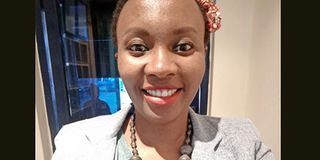Take 5 with Makena Onjerika

Makena Onjerika won the 2018 Caine Prize for African Writing for her story "Fanta Blackcurrant". PHOTO| COURTESY
What you need to know:
- Indeed, the Caine Prize is controversial and there are those who feel that it is an imposition on African writers from the outside.
- It does have its flaws, chief among them being the cost of mailing physical copies for submissions to London.
Makena Onjerika won the 2018 Caine Prize for African Writing for her story ‘Fanta Blackcurrant’, making her the fourth Kenyan to bag the award. Her literary works have previously appeared in Wasafiri and Urban Confusions, and "Fanta Blackcurrant" is forthcoming in New Daughters of Africa and Nairobi Noir anthologies.
1. Congratulations for winning. A lot of the time, writers’ least loved stories are the ones that end up winning prizes. Did you love Fanta Blackcurrant from the go?
I did. I enjoyed experimenting with language in this piece and discovering all the ways in which we bend English into Kiswahili and mother tongue into English. It was also exhilarating going through draft after draft and seeing the story take shape - A wow-I'm-doing-this kind of experience.
2. There's always a lot of debate on the validation of prizes as done by international bodies for African writers. Who do you think are some of the good African writers who should be awarded, if, say, you were running your own prize?
Indeed, the Caine Prize is controversial and there are those who feel that it is an imposition on African writers from the outside. It does have its flaws, chief among them being the cost of mailing physical copies for submissions to London. Many African publishers and publications cannot afford to do so.
This is why there were only about 150 submissions last year, a small number compared to the number of stories African are writing and publishing every year.
Correcting this is one of the tasks the new Caine Prize administrator has taken on.
But one thing that gets overlooked in the debate about the Caine Prize, specifically, is that this prize is judged by African writers. It's as African as the judges and writers are.
I think the best African writers are already scoring African and international prizes. My only point of discontent with regard to prizes is that Yvonne Owuor's novel ‘Dust’ did not get shortlisted for the Man Booker in its time. That book is a BOOK. Go buy and read it.
3. Why is the cause of street children something you chose to focus on? Why is it close to your heart, so much so that you chose to donate a portion of your money in the direction?
This question is an interview favourite. Usually, the person asking this is actually demanding to know why I wrote a story that is so distant from my own reality. Did I intentionally write a sad story of poverty in order to increase my chances of winning the Caine Prize? My answer is: I write what interests me, when it interests me. And seven years ago, for a period of several months, examining the lives of street children in Nairobi was what I needed to do.
There is no topic that is not my territory as a writer. I pledged a donation because I feel for street children, just as I feel for sick Kenyans who go without healthcare. Or those who work so hard and remain in poverty. I am sad about the education system in this country, about corruption, about unemployment, about never ending taxes. I am sad about the ineffectiveness of our electoral system.
I am sad that LGBQT persons face discrimination here and are considered shameful and sinful. I am overwhelmed by the bad news of yet another government loan. Like so many Kenyans, I feel I have no control over what is happening. So I write and sometimes, I make donations.
4. And of course the question that every winner is asked - have you taken a long rewarding vacation yet, or bought the vehicle you said you might buy?
With the traffic jams in this city it makes more sense to buy a motorbike. Cars are pointless. This is to say that I am putting my prize money towards books and carving out time and spaces in which to write. Writing is my great holiday.
5. What can we expect from you next - a longer piece, a novel perhaps?
I am working on short-stories-as-a-novel based in Hunters, Kasarani, in the late 90s and the early 2000s.
I grew up there when there were hardly any houses, let alone the multi-storeyed tenements of today. My mum moved us there from Zimmerman in 1996, and we went a whole year without electricity until KPLC supplied us under the original rural electrification scheme.
The novel will be heavily driven by place and character. I want to remember that place that now only exists in my memories.
A fantasy novel is also gently simmering at the back of my head. I am feeling particularly inspired to write fantasy, especially after the hours I spent with Tade Thompson, N.K. Jemisin, Nnedi Okorafor, Brandon Sanderson, Ursula Le Guin and others.
We'll see what comes out of all these thoughts.





